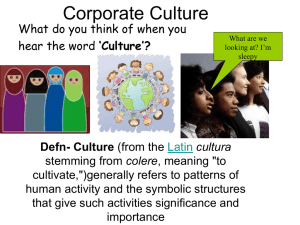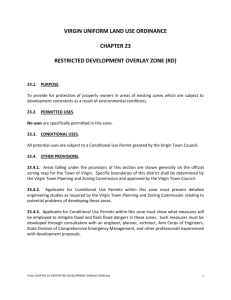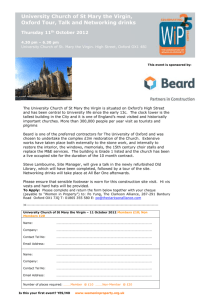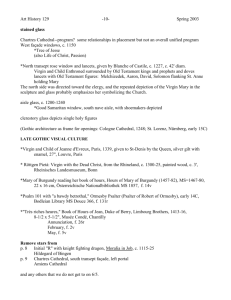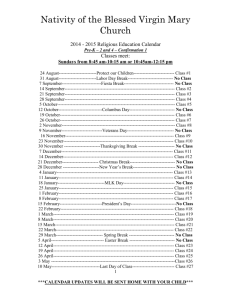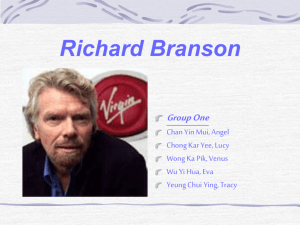How Close did Virgin get to 10-win Value
advertisement
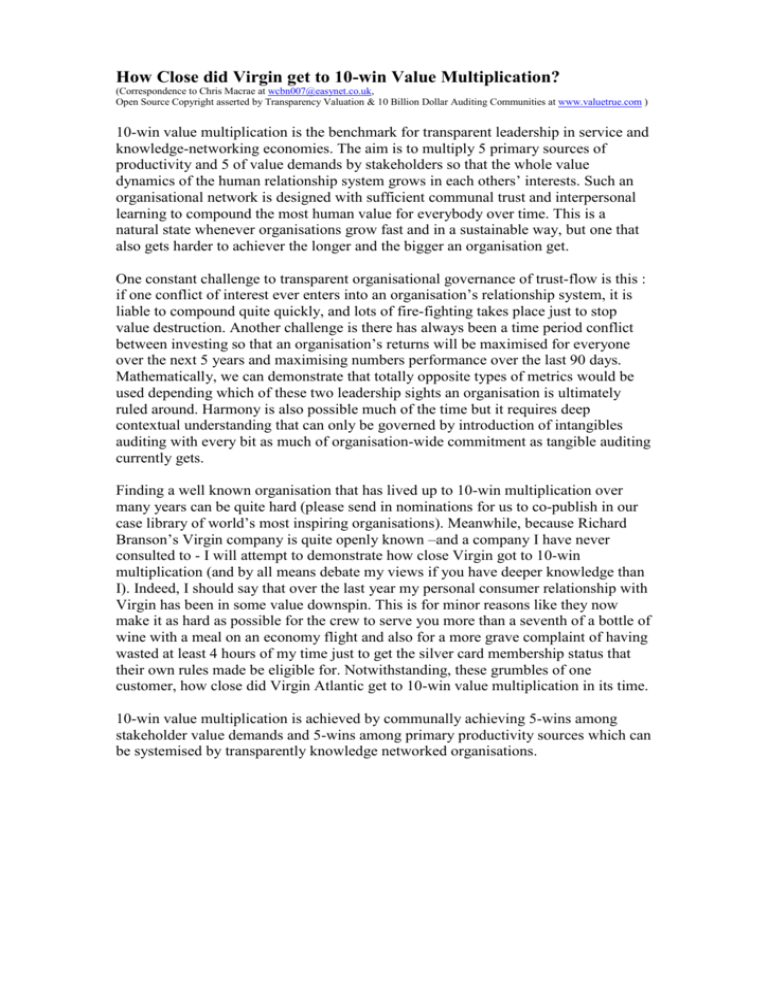
How Close did Virgin get to 10-win Value Multiplication? (Correspondence to Chris Macrae at wcbn007@easynet.co.uk, Open Source Copyright asserted by Transparency Valuation & 10 Billion Dollar Auditing Communities at www.valuetrue.com ) 10-win value multiplication is the benchmark for transparent leadership in service and knowledge-networking economies. The aim is to multiply 5 primary sources of productivity and 5 of value demands by stakeholders so that the whole value dynamics of the human relationship system grows in each others’ interests. Such an organisational network is designed with sufficient communal trust and interpersonal learning to compound the most human value for everybody over time. This is a natural state whenever organisations grow fast and in a sustainable way, but one that also gets harder to achiever the longer and the bigger an organisation get. One constant challenge to transparent organisational governance of trust-flow is this : if one conflict of interest ever enters into an organisation’s relationship system, it is liable to compound quite quickly, and lots of fire-fighting takes place just to stop value destruction. Another challenge is there has always been a time period conflict between investing so that an organisation’s returns will be maximised for everyone over the next 5 years and maximising numbers performance over the last 90 days. Mathematically, we can demonstrate that totally opposite types of metrics would be used depending which of these two leadership sights an organisation is ultimately ruled around. Harmony is also possible much of the time but it requires deep contextual understanding that can only be governed by introduction of intangibles auditing with every bit as much of organisation-wide commitment as tangible auditing currently gets. Finding a well known organisation that has lived up to 10-win multiplication over many years can be quite hard (please send in nominations for us to co-publish in our case library of world’s most inspiring organisations). Meanwhile, because Richard Branson’s Virgin company is quite openly known –and a company I have never consulted to - I will attempt to demonstrate how close Virgin got to 10-win multiplication (and by all means debate my views if you have deeper knowledge than I). Indeed, I should say that over the last year my personal consumer relationship with Virgin has been in some value downspin. This is for minor reasons like they now make it as hard as possible for the crew to serve you more than a seventh of a bottle of wine with a meal on an economy flight and also for a more grave complaint of having wasted at least 4 hours of my time just to get the silver card membership status that their own rules made be eligible for. Notwithstanding, these grumbles of one customer, how close did Virgin Atlantic get to 10-win value multiplication in its time. 10-win value multiplication is achieved by communally achieving 5-wins among stakeholder value demands and 5-wins among primary productivity sources which can be systemised by transparently knowledge networked organisations. Productivity Multipliers of 5-win Network of KM Leadership C Groups of KWs -eg teams, internal nets, practice communities… Organisation K1 K2 Trust-Flow Governance V3 Valuing Intangible Relationship Systems Democracy’s Interfacing of Orgs’ investing Productivities & Demands Customers V1 V2 K3 K4 Network of Orgs K5 Employees Owners V4 V5 Knowledge-Management Transparent Systems of Human Organisation Business Partners Society – globally & locally THE Human System K5 example: Learning Nation Policy Capitals open up linking productivity cultures of human, social, intellectual & environmental MAP Open Source Rights Asserted Let’s start with the 5-win of value demands: V1) Employees. There seems little doubt Virgin employees value their airline more than any other international carrier. This is achieved through such human identification as careful employee brand selection procedures and strong personal support by Branson (employee suggestions are always responded to as priority number 1 management communication and annual parties for crews with Richard as master of ceremonies are legendary). V2) Customers. Over 20 years, I can testify to the fact that the employee-customer service interface has been more memorably enjoyable than any comparable service organisation. Virgin has innovated standards of quality and value in international flights in ways that every air flight passenger would now be missing if it had not been for this leadership standard shaking up what value competitors needed to offer. V3) Owners. One of Branson’s biggest mistakes was to take Virgin public for a short time. He quickly learnt from the conflicts that short-term ownership demands started to make and took the company private again. Consequently, for most of Virgin Atlantic’s existence, the investment interests of Virgin have been wholly in tune with every other stakeholder. That way value multiply for all involved. V4) Business Partners. Branson has described his model as a sort of Western Keiretsu (the Japanese name for networks of organisations). Doubtless, we can imagine that Branson has infuriated some prospective partners who did not plan value in the same way that he did, but his model has always been attract others who have a greater value-delivering competence than the fat guys, and his business model wouldn’t have survived without being win-win to his most sustainable mutual business partners. V5) Society. For most of the last 20 years, British society has rated Virgin as one of its 10 favourite and most responsible businesses. The Virgin brand leadership model has always been at its best when it has said we don’t need to spend money on advertising budgets if every stakeholder does the word-of-mouth marketing for us. It is tantalising to wonder what might have been the social impact if reality-marketing of this kind had been the essence of how branders valued their practice rather than what remains exceptional practice that only few dare do. Now let’s turn to the 5 productivity multipliers of service and knowledge-networking organisations: www.valuetrue.com, London & DC & transparency mapping communities locally worldwide C Beyond-Branding Identity Gravity of Leadership Knowledge Worker Value Demand Multipliers of 5-win Network of Identity Leadership K1) Knowledge Worker. The individual is encouraged to make a difference within the purpose and values walked and talked by Virgin. For example, suggestions made by employees that get implemented by the organisation are named after them. There are also employee of the year schemes influenced by customer nominations. K2) Workgroups. One of Branson’s greatest open secrets is that his organisation is primarily run as a team based model. He has specifically said that he tries to ensure that no manager is ever responsible for more than 60 employees in any part of the organisation. Overall, this makes 360 degree learning appraisals relatively natural and we can be sure that the whole organisational design of Virgin would fall apart if it wasn’t excellent and multiplying learnings and behaviours across teams. In effect, horizontal and hierarchy structures inside Virgin evolve in as near a natural state of adaptive fit as a service organisation can get. K3) Organisation. Virgin corporate identity is designed around the values of fun, youthful spirit of inquiry, service accomplishment and let’s sustain something better on cost and quality than less innovative companies. This make for an open culture which is both value transparent with stakeholder demands and emotionally intelligent in multiplying each productivity level. For example, joy of focus (ie making my difference in life through work) has been demonstrated by the 15000 interview bank of Mihaly Csikszentmihalyi to be the number 1 way to connect the win-win of sustained individual passion to serve and lead at 100% of personal capability with overall organisational pride of purpose. K4) Network of organisations. Clearly partners fairly quickly find they have to match the Virgin pattern of values or look for a different network to participate in because this is a values set that is authenticated by doing. At the same time, Branson has enjoyed extending his bon viveur personality to allying with some niche brands (eg as partners in the top customer award schemes) of unusual individual dedication in their own right. It could be said that the Branson school of entrepreneurship is one of the most privileged to be in. K5) Society’s Productivity. I know that modesty is a charge that is rarely made of Richard, yet I am not aware of him fully beating the drum on how much a great airline impacts the societies that it most intimately connects. At least he has been as vociferous on this recently as the CEOs of South West Airlines and RyanAir have done to name but two of the other airlines that have made my working day a little bit better. The productivity of modern society does depend hugely on safe, friendly, low cost transport systems - Virgin has played an honourable role in this enhancer of social and economic productivity. Indeed having known what the state run European airlines were like 25 years ago when I first become a frequent customer of economy class travel, I can imagine that European entrepreneurs may have more to thank Virgin for than they know.
